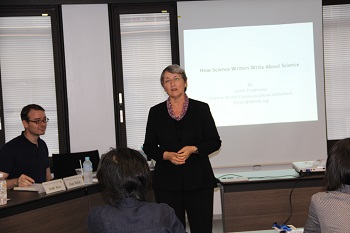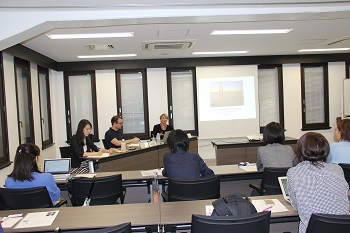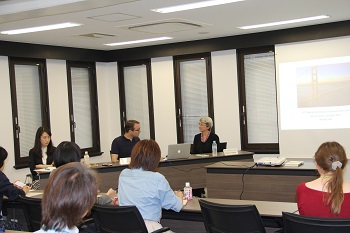How Science Writers Write about Science: Second International Public Relations Workshop held

Date of activity: July 9, 2015
American science writer Lynne Friedmann spoke at the second International Public Relations Workshop, which was held on Thursday, July 9, 2015 at the Hongo Campus. Approximately 20 University of Tokyo administrative staff members in charge of public relations matters and international affairs attended the all-English workshop. On this session’s theme, “How Science Writers Write about Science,” Mrs. Friedmann related to participants how she became a science writer and shared with them her experiences along with amusing anecdotes. She emphasized the importance of developing a narrative rather than simply reporting data when writing about research results.
Mrs. Friedmann gave the participants many pointers on how to translate the data from scientific discoveries into stories that attract the attention of readers. People are hard-wired to like stories, she said. Data on its own belongs in journals, while stories give readers a framework to make sense of new discoveries. To come up with a good story, the writer has to familiarize themselves with the general field that they are covering. Mrs. Friedmann suggested meeting with the top postdocs and graduate students studying with the researcher who made the discovery first before talking to the researcher himself/herself. The writer can then get the basic questions about the field out of the way before they talk to the researcher, whose time is likely limited.
Another major point Mrs. Friedmann made was that research results can gain more attention if the university press officers releasing the results can become a “resource” first, and then a “news source.” Relationship building is key in this regard—if you get to know journalists on a personal level, it is easier to form a mutual relationship of trust with them, increasing the possibility that reporters will want to work with you in the future. Mrs. Friedmann encouraged participants to take a targeted approach to how they send out press releases and think about who the journalists are that they want to reach. She added that a more personalized method of contact also tends to lead to better results in getting journalists interested in your university’s research.
The past couple of decades have brought about many changes in media formats and how news is communicated to the public. In America, for instance, newspapers and prime-time television news programs have given way to the Internet and other diverse forms of media. These days, “anybody can write about anything and publish it anywhere,” as Mrs. Friedmann put it. Nevertheless, science writers are still sought after because of their adherence to the journalistic principles of verifying facts and upholding transparency. These traits allow them to build a relationship of trust with researchers, and this foundation of mutual trust ultimately helps the writers to create stories to which readers can readily relate.
Mrs. Friedmann’s presentation was followed by a lively question-and-answer session in which she gave attendees advice such as coming up with good email subject lines to catch journalists’ attention, finding things to write about by looking on social media, university websites and chat groups, avoiding the use of tired clichés in press releases, and tips on how to get to know researchers on a more personal level. Mrs. Friedmann also talked in detail about news embargoes. She said that universities and companies should have good reasons to place embargoes on press releases and they do not need to be placed on every release regardless of content. Also, she warned that just putting the word “embargo” on a press release doesn’t protect it from being leaked early; members of the media who receive such a press release but haven’t entered into a mutual agreement with the source are under no obligation to keep the content of the release private. She stressed that embargoes should be used to give journalists time to look over and understand the content of a release before it goes public, and that embargoes should be mutually agreed upon by the sender and the receiver, again adding to that foundation of trust that Mrs. Friedmann emphasized the importance of throughout her presentation.
This workshop was well-received by participants, giving them the opportunity to reaffirm the importance of relationship-building among university staff members, researchers and the media as well as the value of incorporating research results into interesting stories.










